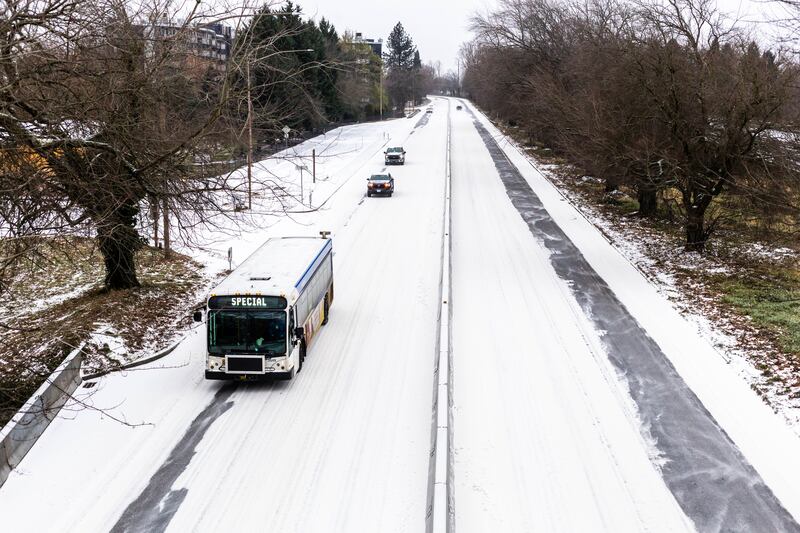Bitter cold and icy, unpredictable precipitation in Northwest Oregon prompted closures of mass transit, highways and even ski lifts today as the Portland region awaited a return to more seasonable weather Saturday.
Early Friday, the city appeared to dodge dire predictions of roads slicked with black ice. Instead, the arctic air mass that barreled out of Siberia and descended on much of the U.S. left Portland in a thin white glaze of snow, sleet and freezing rain.
Warmer, wetter weather is coming Saturday, according to the National Weather Service, but more freezing rain and sleet will fall before then.
“We’re not out of the woods yet,” NWS meteorologist Colby Neuman said, “but most of the metro area should be above freezing by the time we wake up on Saturday.”
TriMet suspended MAX light rail service after a number of trains got stuck in ice and snow. At 1:30 pm, some MAX trains began running again, but transit agency officials warned to expect long delays.
“TriMet crews are working to respond to disruptions across the light rail system,” agency spokeswoman Tia York said in a statement. “However, the weather impacts are widespread and there can be challenges with crews not only getting to work but responding to problem areas.”
Portland International Airport saw dozens of flights canceled, the preponderance of its departures two days before Christmas.
Portland General Electric’s outage map showed 7,000 customers without power in the metro area. Pacific Power’s showed 4,000 customers in the dark, most of them in Astoria.
Interstate 84 was closed in both directions as easterly winds blasted through the Columbia Gorge. A landslide closed Highway 30 10 miles west of Clatskanie, the Oregon Department of Transportation said, and downed trees blocked Highway 100 2 miles east of Corbett.
The Mt. Hood Meadows ski area closed for the day amid concern that freezing rain could cause lifts to ice up. Managers there were also concerned about employees and skiers getting to the mountain safely, said Dave Tragethon, vice president of marketing and communications. Mountain managers are watching conditions to determine operations for the weekend, Tragethon said.

Conditions in Portland are treacherous because dense, frigid air blew into the region from the Gorge, undercutting a mass of warm air above. In such inversions, snow falling from high in the atmosphere hits the warm layer and melts. Those droplets hit the cold layer and refreeze, either as sleet or freezing rain.
The result depends on how thick the cold layer is, Neuman said. If the cold layer is thick enough, we get sleet, which is frozen ice pellets. Travelwise, sleet is better because it doesn’t create a sheet of ice. So far, sleet has predominated in areas close the Gorge because the cold air mass is thicker there. Areas farther south, where the mass is thinner, are more likely to get freezing rain.
“Snow falls into that cold layer and melts,” Neuman said. “If that cold air is deep enough, it reforms as sleet.”
The irony during inversions is that if you want to get warm, you should go higher (but don’t drive).
“Cold air is denser, so it stays near the ground,” Neuman said. “The highest mountains in the coast range are in the 40s.”
The cold will stick around for much of today before a warmer system comes in from the west and blows it out. Weather models show a “juicy frontal system moving into the forecast area Sunday night through Monday,” the NWS said. After that, a series of “atmospheric river events” will arrive, soaking the region with rain. The forecast for Christmas Day is rain and a high of 51 degrees.
“It’s a process to get the cold air out of here,” Neuman said.

